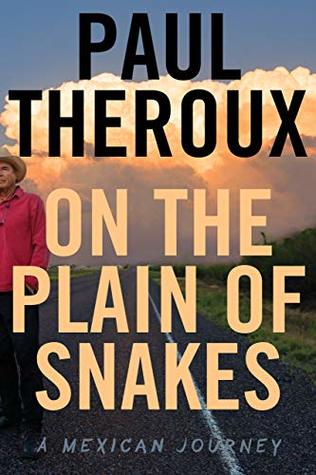More on this book
Community
Kindle Notes & Highlights
by
Paul Theroux
Read between
November 17 - November 24, 2019
This Mexican hospitality to gringos is in ironic contrast to the present ubiquity of Mexicans who are demonized and fenced in, stamped as undesirable, considered suspect, and unwelcome in America.
All but toothless, tattooed, greasy hair, round-shouldered from hugging the handlebars of his Harley, leaning on his hog and swigging a beer in the motel parking lot, he was the toughest-looking man I had seen all week—streetwise, knowledgeable about flying saucers and chain saws and back roads, and familiar with life’s reverses.
“Solo mirando,” I said at each place. Just looking, the theme of my traveling life.
After leaving my car at a secure parking lot ($4 a day), I showed my passport to the US border guard, who asked me my plans for the other side. Business? “Just curiosity,” I said. When he made a disapproving squint, I added, “Don’t you go over now and then?” “Never been there,” he said. “It’s ten feet away!” “I’m staying here,” he said, his squint now suggesting that I should be doing the same.
You know the expression poner salsa a los tacos?” Slather sauce on the tacos—exaggerate.
The day I left El Paso, I fell into conversation with a Texan in a restaurant—a man with a book in his hand I took to be someone I might have something in common with, and so it turned out.
Reflecting on Lopez’s mood, it struck me that the experience of living under a corrupt government and trying to stay honest yourself made people cynical and distrustful of authority, but at the same time self-sufficient and dependent on friends and family, because no one else would help you.
The Fugitive Slave Act made every American complicit in supporting slavery; the criminalizing of humanitarian acts on the border made every American complicit in persecuting migrants.
This was near the Observatorio metro station, named for an observatory built by the national university for stargazing. But some time after the telescope was installed, Mexico City’s polluted air and glary light rendered it unusable.
It is the Mexican boast that the gringo denies death, or has a horror of it, or in Europe sees death as tragic or romantic. “But during Mexico’s twentieth century,” writes Lomnitz, “a gay familiarity with death became a cornerstone of national identity.” He continues, “Mexico’s nationalization of death has a more nihilistic and lighthearted component. It is a modern refurbishment of a medieval theme.”
Memento mori—remember you must die—is the subtext of Mexican life, and no wonder. Consider the shocking statistics of Mexico’s homicides—in 2017, around thirty thousand, the greatest number of annual murders in modern Mexican history. This was exceeded by the murders in 2018, when I was winding up my Mexico trip. No one shrugged at these statistics: the wise ones kept their heads down, they whispered advice, they stayed indoors at night, they locked their doors; the vulnerable ones headed for the border, and safety; the others—the vast majority—continued to live and work as before.
black-and-white poster showing Donald Trump’s face in profile, and in large letters, DONALD, TU ERES UN PENDEJO—Donald, You Are a Dickhead.
The US immigration service doesn’t help us at all. Here’s an example: before Trump, the pages on the ICE website were bilingual. Now not.”
“My wife drives, not me.” He tapped his chest regretfully. “My heart. I don’t travel. There is danger on roads. There is danger on planes. I don’t like airports.” “No one likes airports,” I said. “I don’t like the colors in airports. I don’t like the colors of the insides of planes. I don’t like the smells.” All these seemed to me sensible objections to air travel.
Paz is Mexican in his commitment to pessimism: “The reason death cannot frighten us is that ‘life has cured us of fear.’”


